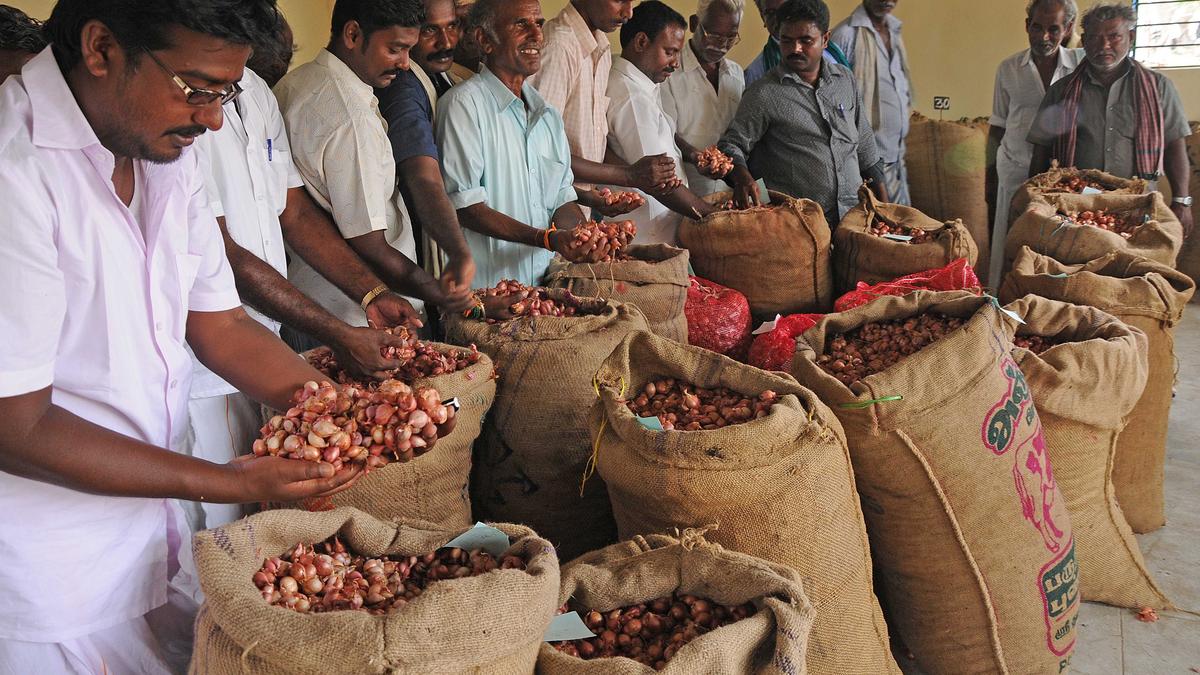
Known for their high pungency and flavour, Chettikulam small onions reach a milestone
The Hindu
Chettikulam small onions, known for pungency and flavor, receive GI tag recognition, sought after for high yield and quality.
The small onions in your ‘sambar’, the famous South Indian lentil-based stew, probably had its roots in the sulphur-rich soils of Chettikulam and villages around it in Perambalur district in central Tamil Nadu. It is from here that the seeds of the shallots grown in most parts of Tamil Nadu and neighbouring States are largely procured. Known for their pinkish hue, uniform size, and pungency, the Chettikulam small onions recently got their unique identity recognised with the grant of the Geographical Indication (GI) tag. A combination of favourable soil and climatic conditions, distinct drying process, and traditional storage methods contributes to the uniqueness of the Chettikulam small onions.
“Small onions grown in Chettikulam and at a dozen surrounding villages are known for their high pungency and flavour. They are not only used to make ‘sambar’, but also ‘kaara kuzhambu’, ‘vadagam’, and even Siddha medicines. Our onions are also the most preferred variety among farmers for being used as seeds. Farmers in most parts of the State and even Kerala and Mysore procure our onions for propagation as they can be assured of 100% germination and a high yield. Our onions have a longer shelf-life; if properly stored, they can last even up to 10 months,” says R. Gunasekaran, president, Chettikulam Small Onion Farmers’ Producer Association, Perambalur.
Chettikulam and over a dozen surrounding villages in the Alathur block of Perambalur district is the key hub for shallot cultivation. The crop was raised on 7,075 hectares in Perambalur district during 2023-24, with production of nearly 78,000 metric tonnes. Of this, the Alathur block alone accounted for 3,625 hectares and production of nearly 40,000 tonnes.
Small onions are generally considered a good source of antioxidants and nutrients. They have been a staple item in the South Indian kitchens. Given their superior quality and shelf-life, the Chettikulam small onions are in high demand in the domestic market as well as for exports to countries with significant population of South Indian migrants, say officials. More significantly, about 70% of the harvest is used as “propagating material” in other onion-growing regions.
Recognising the uniqueness of the small onions grown here, the Tamil Nadu State Agricultural Marketing Board and the Chettikulam Small Onion Farmers’ Producer Association, with the support of NABARD-Madurai Agri Business Incubation Forum, had filed the application for the GI tag for the Chettikulam small onions in 2022.
The soil in Chettikulam is rich in sulphur, which contributes to the onions’ unique pungency, and the onions were notable for having 15-18 layers of dried outer scales that enhance their shelf-life, the application said, listing the salient features of the variety. The region’s red, loamy, and black soils, with their moderately alkaline nature, provide the ideal conditions for cultivating high-quality onions. Farmers here adopt a unique post-harvest drying process, called ‘Muttu Kattuthal’. Under it, the onions are arranged in piles for an open drying process. The process is aided by the dry and hot climatic condition of the region. Most farmers also adopt a traditional and eco-friendly storage method, called ‘Pattarai’. The onions are stored in an elevated structure, usually covered with coconut fronds, thatches, or bamboo, which protects them from sun and rain. The well-ventilated structure allows the onions to be stored for a few months.
The crop is usually grown in two of three seasons by most farmers in the district, the third season largely dependent on the rain. The farmers are dependent on the traders and wholesale market in Tiruchi to sell their produce. Price fluctuations is a key issue. “Normally, when bought for seeds, we get a good price. But if there is a glut in the market during other seasons, the farm gate price of the small onions could fluctuate badly and drop to as low as ₹10 a kg. We hope that the GI tag would help us to get a better price,” says Mr. Gunasekaran, who has been growing small onions and vegetables for decades.





















 Run 3 Space | Play Space Running Game
Run 3 Space | Play Space Running Game Traffic Jam 3D | Online Racing Game
Traffic Jam 3D | Online Racing Game Duck Hunt | Play Old Classic Game
Duck Hunt | Play Old Classic Game











